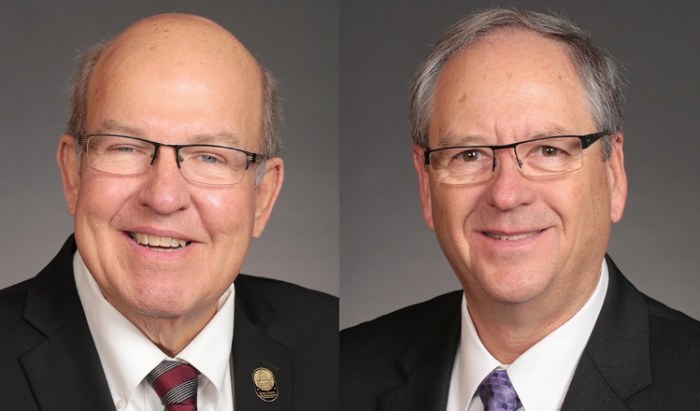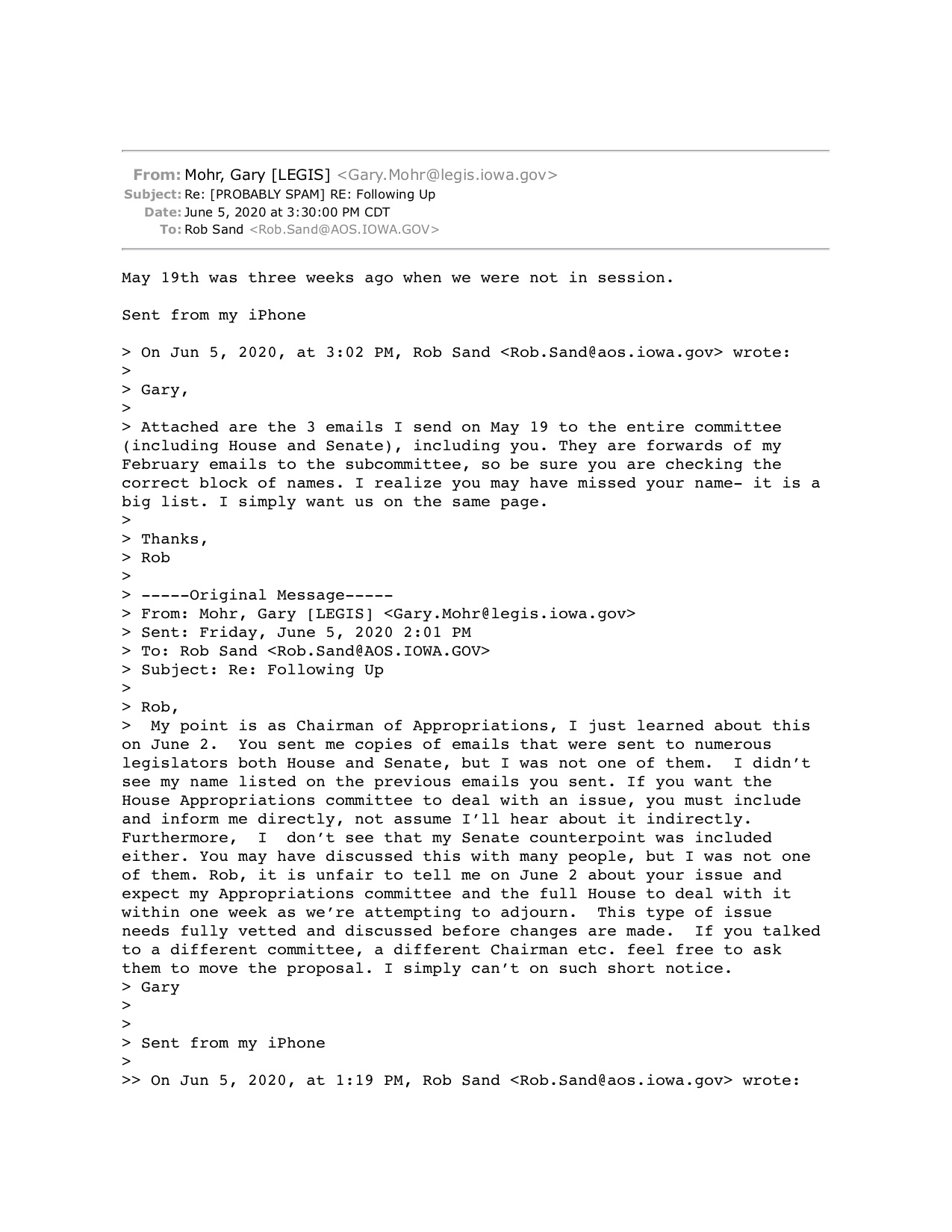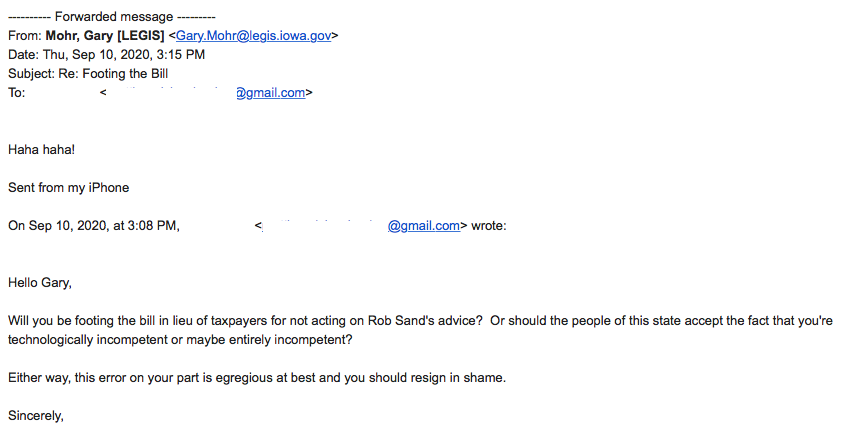State Auditor Rob Sand had “great news” to share with members of the Iowa House and Senate Appropriations Committees in May. Federal officials had agreed not to demand repayment for alleged overbilling, provided that Iowa changed its billing practices for future audits. The savings to the state would amount to tens of thousands of dollars for each fiscal year.
Documents Bleeding Heartland obtained through a public records request confirm that key Reynolds administration officials were on board with the reform plan, and Iowa Senate appropriators took it up in June as the legislature was completing its work.
The records also show that State Representatives Gary Mohr and John Landon refused to move the fix through the Iowa House.
What they don’t explain is why.
“YOU WILL STOP ANY TAXPAYER DOLLARS FROM BEING WASTED ON A REFUND”
Federal auditors working for a branch of the U.S. Department of Human Services had warned the state after reviewing accounts for the 2017 fiscal year. They learned that under Iowa law, local governments pay less than state agencies for certain services from the State Auditor’s office.
Senior negotiator Karen Wong explained in a May 1 letter that federal guidance requires that all users be “billed the same rate for the same service” when federal funds are subsidizing state audits. The upshot was that state agencies had overbilled the federal government $624,000 for that year.
One solution would be for the state to repay the federal government’s share of the overbilled amounts, Wong wrote. Her staff estimated that it might cost $49,920 to settle the accounts for fiscal year 2017.
However, federal officials would consider the matter resolved if the Iowa legislature amended the statute “to bill all user agencies and bill all users (State agencies and local governments) at the same rate.”
Early in 2020, Sand had been working with Governor Kim Reynolds’ senior legal counsel Sam Langholz and state budget director David Roederer on a new funding proposal for his office, which would fix this problem. The state auditor had presented the idea to representatives and senators on the Administration and Regulation Budget Subcommittee on February 5. Landon and State Senator Dennis Guth co-chair that panel.
The COVID-19 pandemic disrupted the appropriations process along with everything else. But while lawmakers were on hiatus, Sand brought subcommittee members and House and Senate leaders from both parties up to speed via email on May 13. The partial refund federal officials had proposed “would be expensive for taxpayers,” because their calculations would “find a similar amount overbilled for every year going backward or forward.”
But we also have great news. They agreed to include as another option for correcting the situation, equalizing our billing rates rather than paying a refund. That means if you pass this funding reform proposal, you will stop any taxpayer dollars from being wasted on a refund. But also means if you do not pass it, taxpayers will take the hit, and may again year after year until you do pass it.
The following week, Sand forwarded that message and other relevant correspondence to all members of the House and Senate Appropriations Committees.
I’m writing to make sure that you are all aware of this issue. Short story is that federal auditors believe the statutory funding system for AOS [Auditor of State] results in overbilling the feds, but if the statute is fixed this year they will not require the state to pay any refunds.
Senate Appropriations Committee chair Michael Breitbach quickly replied that he would review the matter.
There was no response from Landon or from House Appropriations chair Mohr.
“THERE JUST ISN’T TIME”
Having heard nothing from key House Republicans, Sand circled back with Mohr by email on June 2, the day before lawmakers were set to reconvene in Des Moines. He followed up with a phone call and email on June 5.
This time, Mohr replied within minutes, but was dismissive.
I’ve talked to several Appropriations committee members as well as leadership. Committee members are not informed on this issue and do not want to change the process on such short notice without a full vetting of the issues. With our hope to adjourn next week, there just isn’t time. Having just heard about this from you on June 2, I have to agree with my committee members. Also, leadership is determining what bills to eliminate in order to adjourn next week, not what bills to add. With those factors in mind, we will not be able to take up your issue this session. Thanks, though, for giving me a heads up on the background of this topic.
The excuse wasn’t credible. Later on June 5, the chamber was set to debate a tort reform bill Republicans had just overhauled to grant businesses sweeping immunity from lawsuits related to COVID-19.
Over the next nine days, House leaders found time to advance several other brand-new proposals, including bills on policing reform, limiting the Iowa secretary of state’s emergency authority, establishing a 24-hour waiting period for abortions, and restricting how county auditors can process absentee ballot request forms. The last two were introduced less than 24 hours before lawmakers adjourned for the year.
In any event, Mohr had not been in the dark until June 2. Sand set the record straight.
Thanks for getting back to me. I’m sorry, but I have to correct you on timing because I have been sharing this with the legislature all session. I brought the issue to the subcommittee and to leadership back in February, and to the whole committee in mid-May. I presented, at those times, appropriation changes to-the-dollar for every agency involved, the language necessary itself, and the communications from the federal auditor that a failure to act will cost Iowa taxpayers. I’ve offered to sit down with anyone who had questions.
That offer still stands. This is just a basic, good government, money saving proposal that could pass unanimously.
Mohr stuck to his story.
My point is as Chairman of Appropriations, I just learned about this on June 2. You sent me copies of emails that were sent to numerous legislators both House and Senate, but I was not one of them. I didn’t see my name listed on the previous emails you sent. If you want the House Appropriations committee to deal with an issue, you must include and inform me directly, not assume I’ll hear about it indirectly. Furthermore, I don’t see that my Senate counterpoint was included either. You may have discussed this with many people, but I was not one of them. Rob, it is unfair to tell me on June 2 about your issue and expect my Appropriations committee and the full House to deal with it within one week as we’re attempting to adjourn. This type of issue needs fully vetted and discussed before changes are made. If you talked to a different committee, a different Chairman etc. feel free to ask them to move the proposal. I simply can’t on such short notice.
Sand had copied Mohr and Breitbach on all three emails he sent on May 19 (first, second, third).
But when he attached copies of those messages to his next reply, the House Appropriations chair offered a new objection: “May 19th was three weeks ago when we were not in session.”
You read that right. After falsely claiming Sand brought the reform proposal to his attention too late, Mohr was now faulting the auditor for giving him a heads up before lawmakers came back to the capitol.
“WE JUST NEED YOUR END TO SAY YES”
Breitbach took up the audit reform language in the Senate Appropriations Committee but couldn’t reach agreement with counterparts in the lower chamber.
As lawmakers sped toward adjournment, Sand made one last push with House Republicans. On the morning of Saturday, June 13, he sent identical emails to Landon and Mohr.
I hope you are well. I just tried calling you. I heard from the Senate that they have prepared the language, and they shared it with me. It does the job to save the state all that money for 2017, and any other year’s audit. They’ve shared that the House is saying no to it.
It can’t merely be a timing issue, as we are seeing numerous new bills being offered.
I realize everyone is tired and wants to go home. This is an easy chance to do the right thing for taxpayers. The bill is already prepared. We just need your end to say yes.
I’m in my office in Room 111 if you have questions or need me for anything. I am happy to be helpful however that may be.
About an hour later, Sand sent similar messages to House Speaker Pat Grassley and Majority Leader Matt Windschitl. They have the final say on which legislation comes up for a vote in the lower chamber.
Since Mohr, Landon, Grassley, and Windschitl did not respond to Bleeding Heartland’s inquiries about this matter, we can only guess why House Republicans refused to add one more amendment to a budget bill. Clearly time constraints were not the problem, since Republicans were rewriting many other bills during the final days of the session. The governor didn’t oppose the measure; on the contrary, her legal counsel had helped shape the plan.
In trying to think of a downside, it occurred to me that House Republicans may have been reluctant to give a win to a young and ambitious Democratic official. But that explanation makes little sense. Sand was already bragging about the deal he had negotiated with federal officials and has continued to do since the session ended.
Mohr and Landon could have shared credit as good stewards of public dollars. Instead, they became the stars of a June 16 news release titled, “State Auditor Rob Sand Blasts Iowa House Republicans for Wasting Taxpayer Money by Refusing to Conform to Federal Audit.”
“It is with confusion and frustration that I inform Iowans that the Iowa House Republican leadership chose to waste likely hundreds of thousands of taxpayer dollars by refusing to bring up the Auditor of State funding reform plan I proposed. Democrats in both houses were supportive, as were Senate Republicans, who tried to get their House counterparts to take up the reform. This failure can only be explained as House Republicans, or at least their leadership, committee chairs, and subcommittee chairs, putting partisanship ahead of the public,” said Auditor Sand. […]
Fortunately, Sand and his staff were able to get federal auditors to agree to waive any repayment or penalties if the legislature passed the reform Sand had proposed, which federal auditors agreed would fix the issue. The reformed law would also prevent the issue and the fines from re-occurring in the future.
Sand informed legislators of the successful negotiation at that time [in mid-May], giving them the opportunity to avoid having to refund or be fined by the federal government, only to see Iowa House Republicans refuse to take up the issue.
“I appreciate Republican State Senator Michael Brietbach’s efforts to pass this bill. But House Republicans—or at least, Speaker Grassley, Leader Windschitl, and Chairs John Landon and Gary Mohr chose to ignore it. Their failure to do their jobs means taxpayers will pay the price the federal government demands,” Sand said. […]
As it happens, that news release prompted me to request records related to this controversy.
I would welcome insight from legislative observers on why the audit reform proposal hit a roadblock and will update this post as needed.
UPDATE: Although Mohr never responded to my inquiries, he replied right away to a Bleeding Heartland reader who emailed him after reading this post.
Appendix 1: May 1, 2020 letter to the State Auditor’s office from Karen Wong, Senior Negotiator for Cost Allocation Services at the U.S. Department of Health and Human Services Program Support Center, Financial Management Portfolio
Appendix 2: Funding reform proposal State Auditor Rob Sand sent to members of the Administration and Regulation Appropriations Subcommittee in February 2020
Appendix 3: May 14 news release from State Auditor’s office (emphasis in original)
State Auditor Rob Sand Offers Legislature Opportunity to Prevent Federal Audit Costs
Federal Government Seeking refund of part of $624,000 in overbillings from 2017, but will waive refund if funding laws changed.
Auditor Sand sent the below letter to members of the legislature and Governor Reynolds purposing changes in billing to ensure nothing like this happens again:
I proposed reforming the funding system for the State Auditor’s Office at in my in-person presentation to you on February 5, and in a written summary accompanying it. I updated that with specific numbers in the email below.
At that time I noted numerous benefits of the funding reform proposal, including that it would “reduce risk to taxpayers of adverse federal dollar audit findings.”
Now, federal auditors are finalizing the federal dollar audit for fiscal year 2017 state agency reimbursement requests. They assert state agencies overbilled the federal government $624,000 for audits in 2017, and as one option for correcting the situation, are proposing the State pay a refund. Under their form of calculations, they will find a similar amount overbilled for every year going backward or forward. This would be expensive for taxpayers.
But we also have great news. They agreed to include as another option for correcting the situation, equalizing our billing rates rather than paying a refund. That means if you pass this funding reform proposal, you will stop any taxpayer dollars from being wasted on a refund. But also means if you do not pass it, taxpayers will take the hit, and likely will again year after year until you do pass it.
Let me again emphasize this proposal has additional benefits. It incentivizes all state agencies to run cleaner and leaner to reduce their audit costs. And, as I informed you in mid-February, if the reform proposal affects the number of state dollars devoted to audits at all, it would reduce them. That would free dollars for other uses.
Attached again are the summary of the reform proposal, the statutory language necessary, and the exact budget adjustments necessary for each agency. Please contact me with any questions, comments, or concerns.
“I’ve worked hard with my office to come up with a solution that fixes a problem that has existed in this office for at least a decade. I hope both Democrats and Republicans in the legislature will do the right thing, not only to save taxpayers money at a time when it’s desperately needed, but also the right thing for good honest government,” said Auditor Sand.
Appendix 4: June 16 news release from the State Auditor’s office
State Auditor Rob Sand Blasts Iowa House Republicans for Wasting Taxpayer Money by Refusing to Conform to Federal Audit
“It is with confusion and frustration that I inform Iowans that the Iowa House Republican leadership chose to waste likely hundreds of thousands of taxpayer dollars by refusing to bring up the Auditor of State funding reform plan I proposed. Democrats in both houses were supportive, as were Senate Republicans, who tried to get their House counterparts to take up the reform. This failure can only be explained as House Republicans, or at least their leadership, committee chairs, and subcommittee chairs, putting partisanship ahead of the public,” said Auditor Sand.
Sand’s proposal would have improved efficiency across state government, aligned incentives, and prevented any adverse findings or fines in a federal audit. He provided specific language to fix the statute and to-the-dollar budget adjustments for every agency. Those adjustments showed an expected decrease in taxpayer dollars necessary for auditing, although Sand felt it likely the figure would stay steady.
Then in mid-May, federal auditors finishing their review of 2017, prior to when Sand took office, claimed that Iowa overbilled the federal government that year by over $600,000. Their audits would have similar findings going back or forward to other years if they examined the same issue, as this billing system is mandated by Iowa law.
Fortunately, Sand and his staff were able to get federal auditors to agree to waive any repayment or penalties if the legislature passed the reform Sand had proposed, which federal auditors agreed would fix the issue. The reformed law would also prevent the issue and the fines from re-occurring in the future.
Sand informed legislators of the successful negotiation at that time, giving them the opportunity to avoid having to refund or be fined by the federal government, only to see Iowa House Republicans refuse to take up the issue.
“I appreciate Republican State Senator Michael Brietbach’s efforts to pass this bill. But House Republicans—or at least, Speaker Grassley, Leader Windschitl, and Chairs John Landon and Gary Mohr chose to ignore it. Their failure to do their jobs means taxpayers will pay the price the federal government demands,” Sand said.
Any settlement of the final amount for 2017 will be smaller than the total calculation, but will likely be repeated until the reform is passed.
Top image: Official photos of State Representatives Gary Mohr (left) and John Landon.




1 Comment
The party of fiscal responsibility
strikes again.
rosalita Tue 8 Sep 11:43 AM